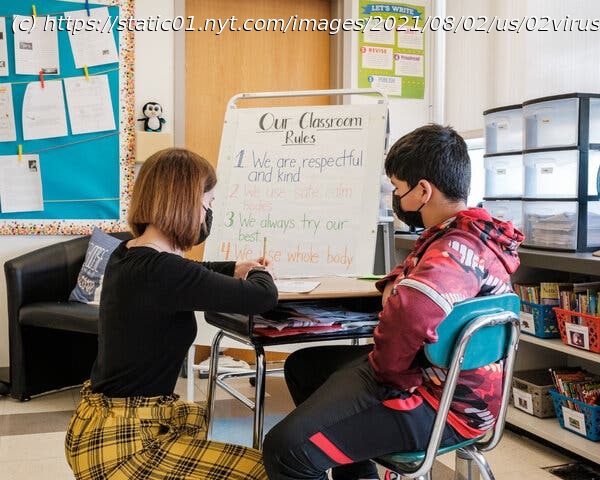Classrooms are opening their doors to a different pandemic. Here is how to think about risk.
Last week, in what was intended to be an internal document, the Centers for Disease Control and Prevention made a stark admission: The highly contagious Delta variant had redrawn the battle lines of the coronavirus pandemic, necessitating new public health measures like universal mask mandates. Or, as the agency put it in the document, which was obtained by The New York Times, “ the war has changed.” The news came just as the first school districts were preparing to reopen; children in Atlanta and some of its suburbs head back to the classroom this week. Over the past year, there has been contentious debate over how much schools contribute to the spread of the virus and whether, and when, they should close. For some parents, teachers and officials, keeping schools open when a new, poorly understood virus was circulating seemed like an unacceptable risk. For others, however, it was school closures that posed the bigger danger — of learning loss, widening educational disparities and worsening mental health, not to mention the hardships for parents. As the new school year begins, however, the C.D.C., the American Academy of Pediatrics and many other experts agree that reopening schools should be a priority. “We are in a very different place than we were a year ago,” said Elizabeth Stuart, an epidemiologist at Johns Hopkins Bloomberg School of Public Health. “We have very effective vaccines, we know a lot more about how to open schools safely, and we, I think, have a heightened awareness of some of the challenges that kids face when they’re not in in-person school.” Just a few months ago, with vaccinations for those 12 and older proceeding at a steady clip and new cases declining, the stage seemed set for at least a partial return to normal. Delta has thrown that into question. Much remains unknown about the variant, including whether it affects children more seriously than earlier forms of the virus. And with vaccination rates highly uneven, and most decision-making left up to local officials, the variant adds new uncertainty to the coming school year — and makes it even more critical for schools to take safety precautions as they reopen, scientists said. “Delta, because it’s so contagious, has raised the ante,” said Dr. William Schaffner, medical director of the National Foundation for Infectious Diseases and a vaccine expert at Vanderbilt University. “It makes all these details all the more important.” Here are answers to some common questions. Overall, studies suggest that — last year at least — in-school transmission was generally low when schools took basic precautions. “When you have masks and even three-foot distancing, you are not going to see major outbreaks in schools,” said Dr. Yvonne Maldonado, a pediatric infectious-disease specialist at Stanford Medicine and chair of the American Academy of Pediatrics Committee on Infectious Diseases. “There may be some transmissions, but they’re going to be pretty relatively infrequent.” Studies in North Carolina, Utah, Missouri and elsewhere revealed that when schools layered several kinds of safety measures — some combination of masking, symptom screening, distancing, improved ventilation, virus testing, handwashing and dividing students into smaller groups — transmission rates in schools were even lower than they were in the surrounding community.






